AuctionGate | Logistic CRM system - Site page "Price lists"
The site page "Price lists" is designed to create a price list, with the ability to calculate the cost of shipping the vehicle to the desired country.
The functionality that is available on the page:
-
creating a price list;
-
price list editing;
-
creating a copy of the price list;
-
PDF price list creation;
-
price list export;
-
price list import;
-
price list deletion.
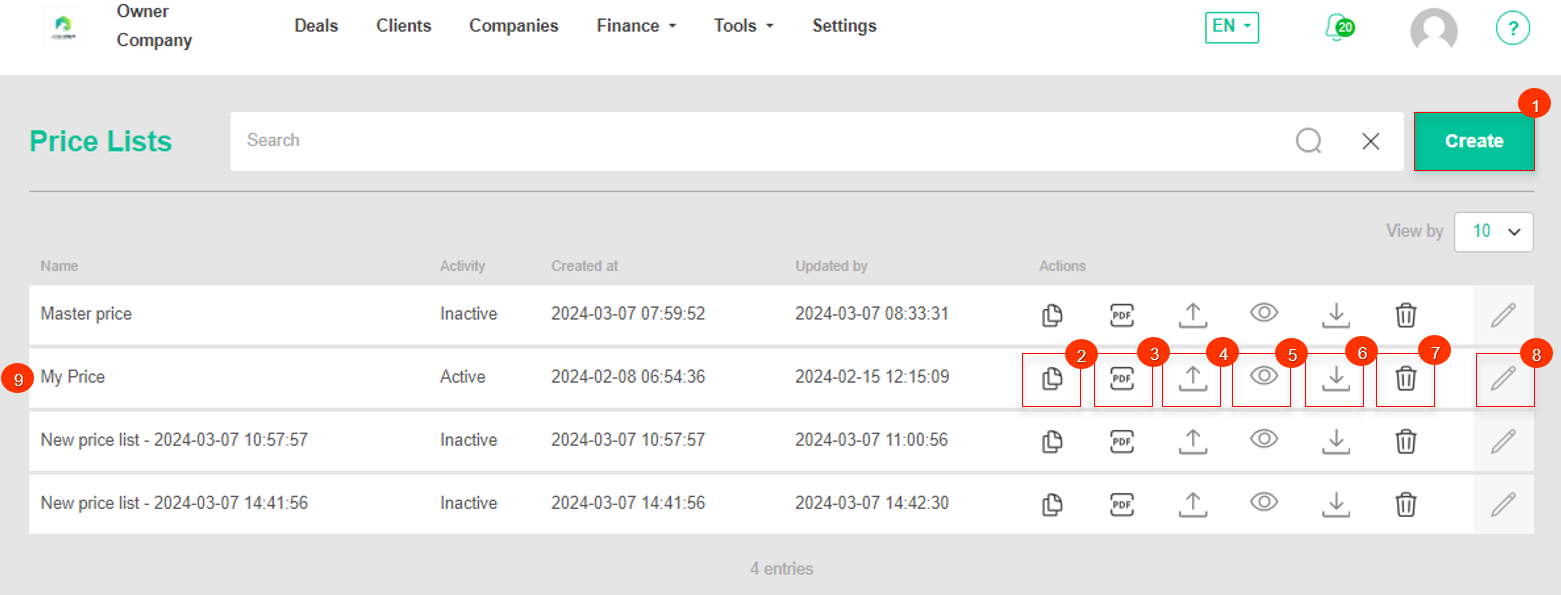 Figure 1 - Price lists page
Figure 1 - Price lists page
Creating a price list
In order to create a price list, click on the "Create" button (Figure 1, Pointer 1). After that the site page "Edit price list" will open, in which fill in the fields (Figure 2):
-
"Title" - enter the price list title;
-
"Activity" - select the activity status from the drop-down list that opens when you click on the
 button.
button.
After that, proceed to fill in the tabs.
Note: If you select the activity status "Inactive", the corresponding price list will not be available for use in calculations in Delivery Calculator.
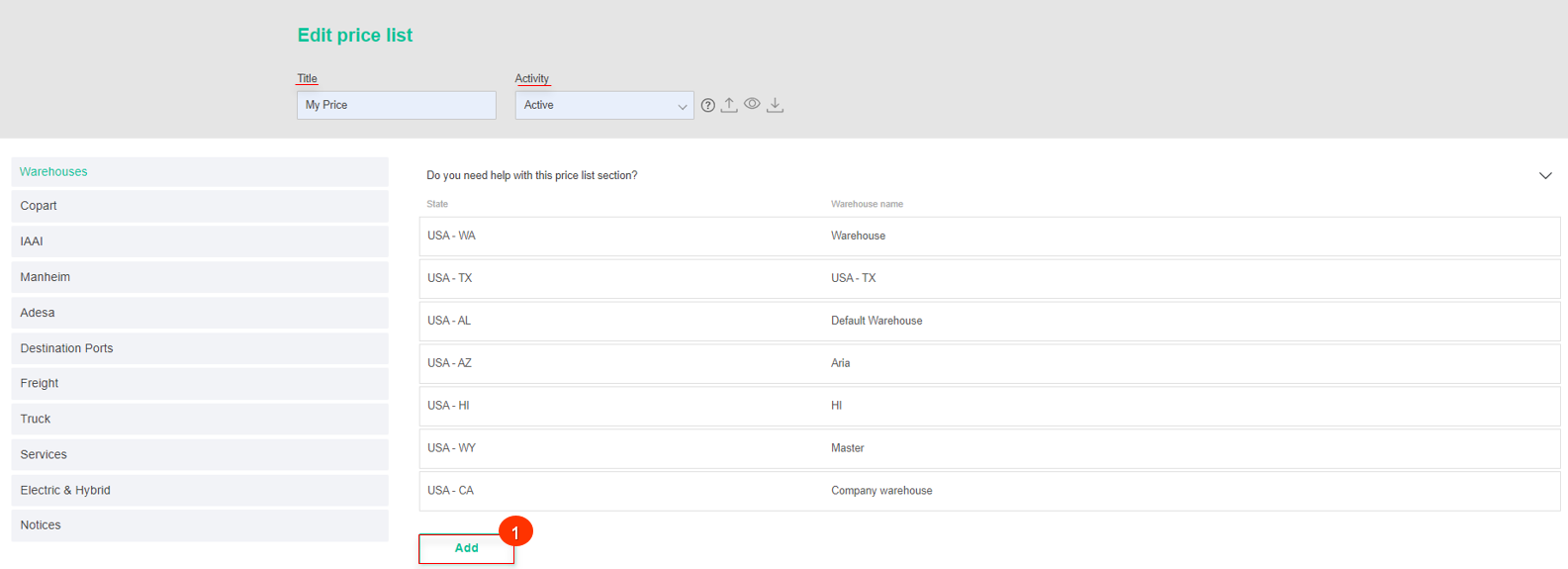
Figure 2 - Edit price list page
Warehouses tab
When creating a price list, the warehouses that are created on the site on the "Settings" page are automatically filled in. In order to add a new warehouse from which to load, click on the "Add" button (Figure 2, Pointer 1). After that the "Warehouse" window will open in which fill in the fields (Figure 3):
-
"Name" - enter the name of the warehouse;
-
“Choose state” - from the drop-down list that opens when you click on the
 button, select the state where the warehouse is located;
button, select the state where the warehouse is located;
To save the data click on the "Save" button If canceled, click "Close" button. As a result, the created warehouse will be displayed in the table.
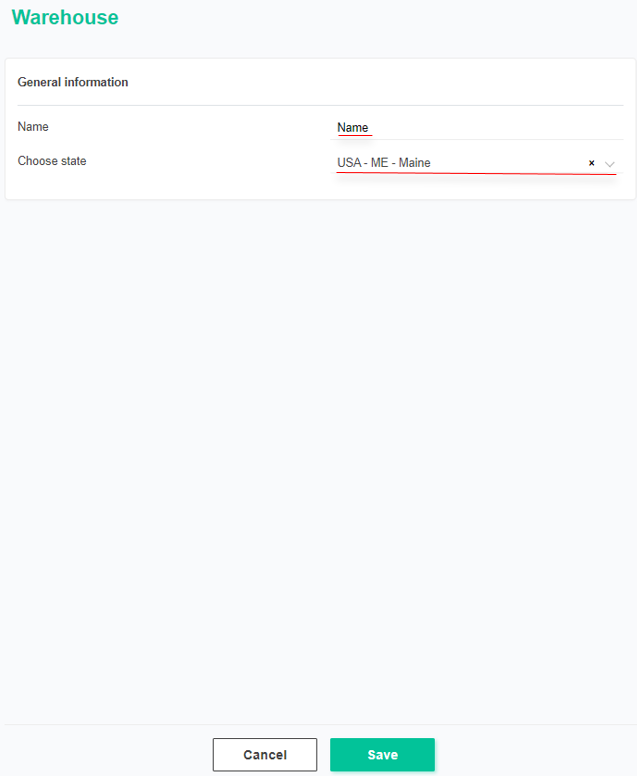 Figure 3 - Warehouse window
Figure 3 - Warehouse window
Tab "Copart"/"IAAI"/Manheim/Adesa
To enter information on any of the tabs press the "Edit" button, in case of canceling actions - "Close" (Pointer 2).
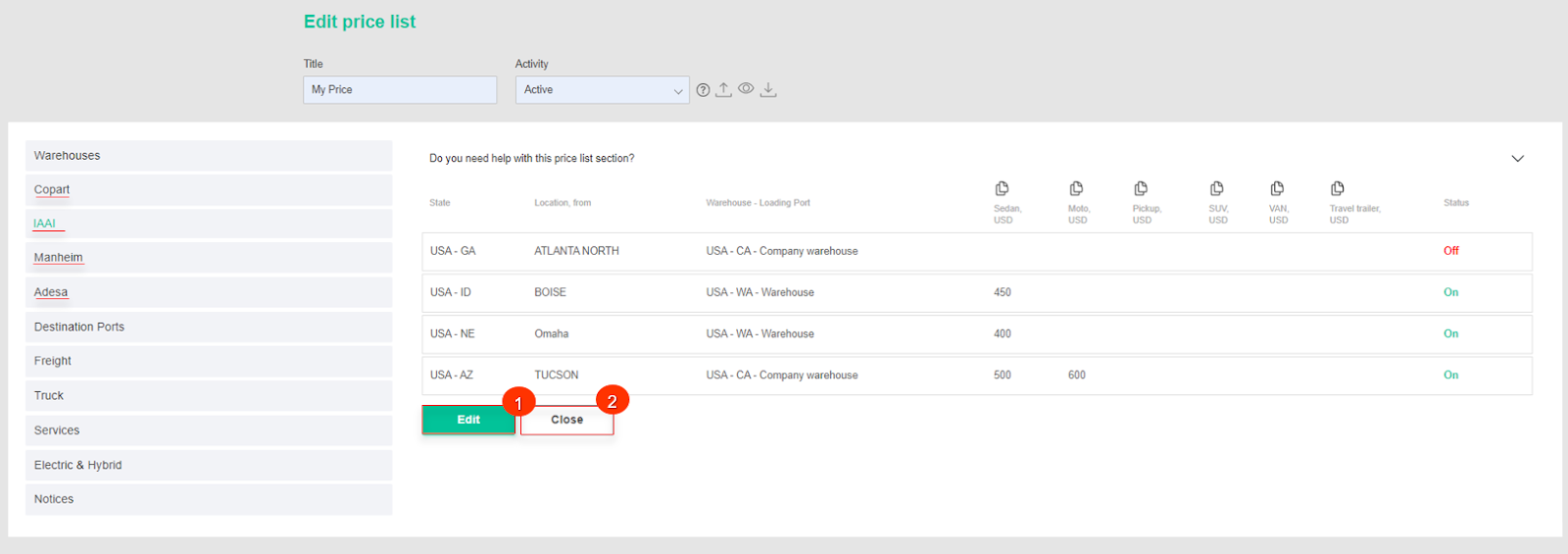 Figure 4 - Edit price list page
Figure 4 - Edit price list page
To add shipping costs from the auctions location to the warehouse where loading will take place, select one of the following methods:
-
To add one or more locations, click on the "Add" button (Figure 5, Pointer 1). This will add a row (Pointer 2) in which fill in the field:
-
“State” - select a state from the drop-down list that opens when you click on the
 button;
button; -
“Location, from” - select the city where the auction site is located from the drop-down list that opens when you click on the
 button;
button; -
“Warehouse - Loading Port” - from the drop-down list that opens when you click on the
 button , select the warehouse to which the delivery will be made;
button , select the warehouse to which the delivery will be made; -
using the keypad or by pressing the
 buttons , enter the delivery cost in the appropriate field by vehicle type (Pointer 3);
buttons , enter the delivery cost in the appropriate field by vehicle type (Pointer 3); -
"Status" - click the "On" button to activate the location, in case of cancellation the button is "Off".
To create multiple locations, add the required number of rows and repeat the process of filling in the fields (described above).
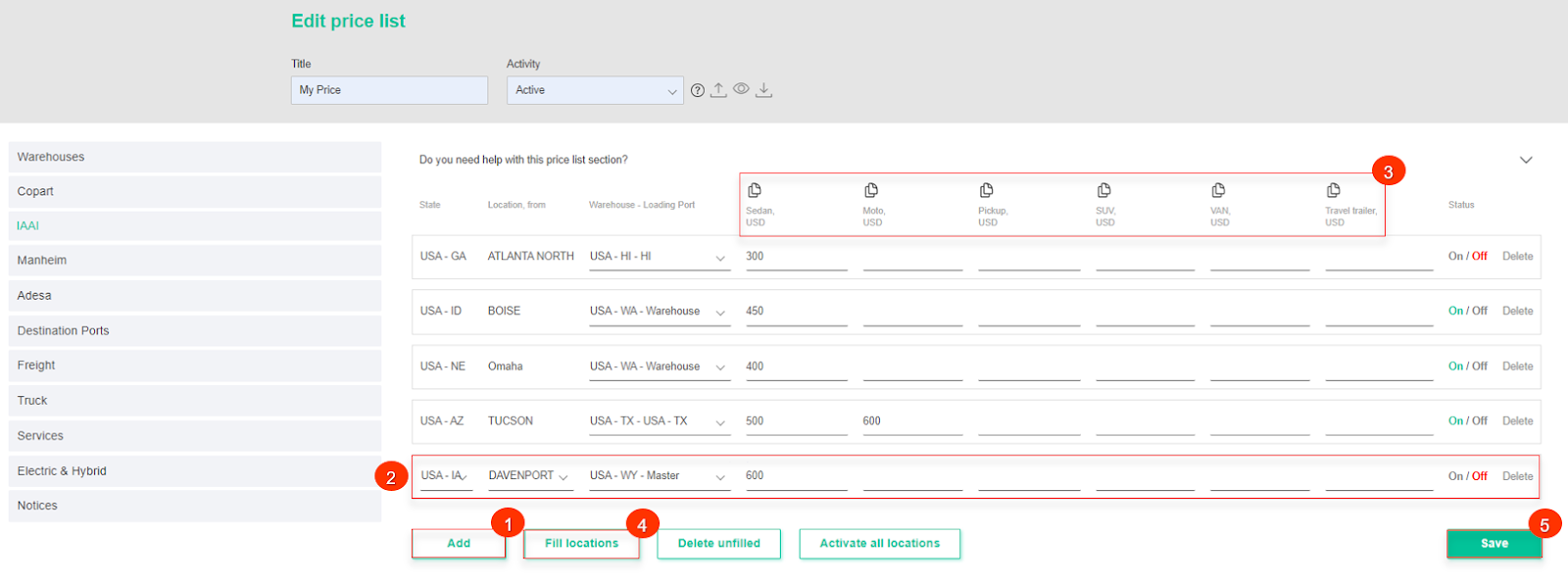 Figure 5 - IAAI tab. Adding one or more locations
Figure 5 - IAAI tab. Adding one or more locations
-
To add locations in bulk, click on the "Fill locations" button (Figure 5, Pointer 4). This will open a list of locations, in which select the required number of locations based on the state and location of the auction (Figure 6). Then fill in the fields:
-
“Warehouse - Loading Port” - from the drop-down list that opens when you click on the
 button , select the warehouse to which the delivery will be made;
button , select the warehouse to which the delivery will be made; -
using the keypad or by pressing the
 buttons , enter the delivery cost in the appropriate field by vehicle type (Pointer 1);
buttons , enter the delivery cost in the appropriate field by vehicle type (Pointer 1); -
“Status” - press the "On" button to activate the location, in case of cancelation the button is "Off".
To delete unfilled locations, click on the "Delete unfilled" button (Pointer 2). As a result, only those locations with filled fields will be displayed in the list.
Note: The mandatory fields are "Warehouse, port of shipment" and the indicated value, for the first vehicle type (Pointer 3).
If you want to delete a line, click on the "Delete" button (Pointer 4). After that a window will open, in which to confirm the deletion of location click on the "Delete" button, to cancel the button - "Cancel" (Figure 7).
To activate all locations, click on the "Activate all locations" button (Pointer 4). After that a window will open, in which to confirm the activation of all locations click on the "Activate" button, to cancel the button - "Cancel" (Figure 8). After adding locations using either method, click the "Save" button to save the data (Figure 5/Pointer 5, Figure 6/Pointer 6).
This will result in the created location(s) being displayed on the tab.
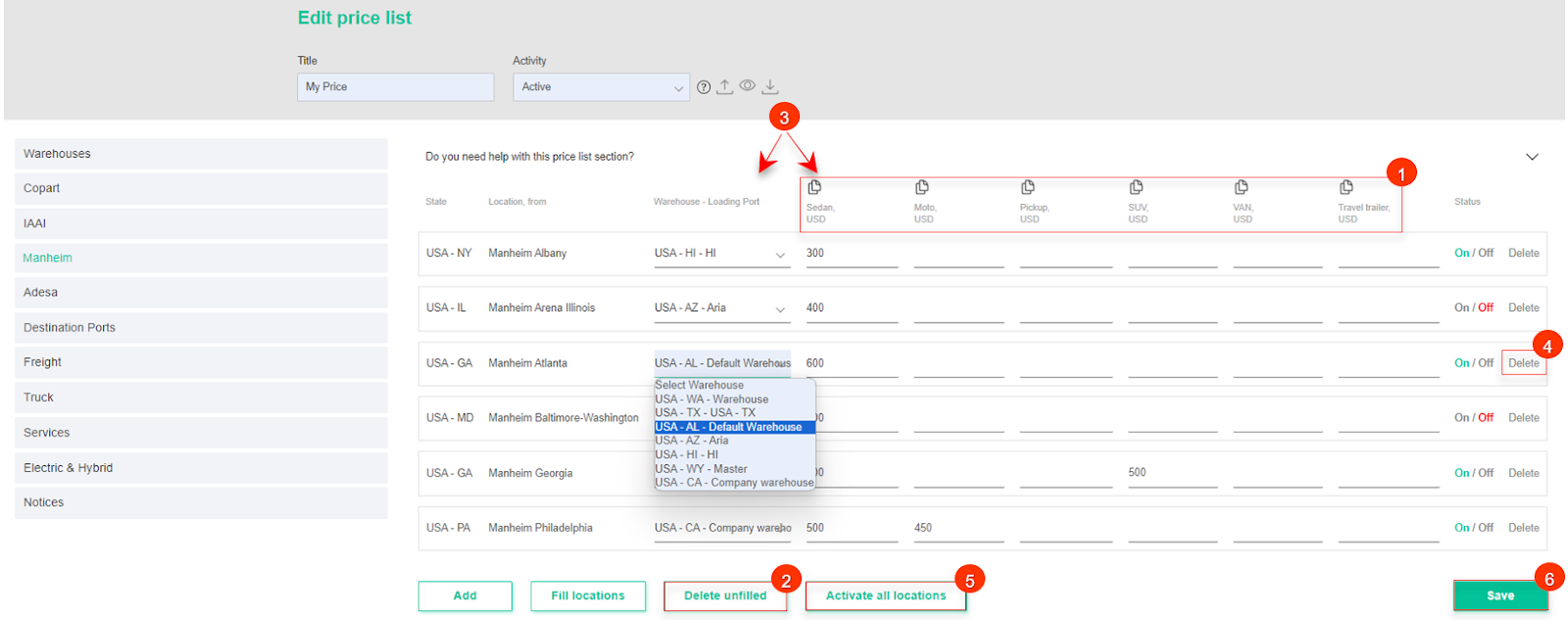 Figure 6- Manheim tab. Adding locations en masse
Figure 6- Manheim tab. Adding locations en masse
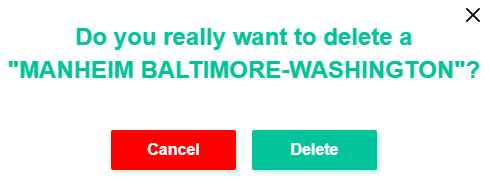 Figure 7 - Confirmation/cancellation of location deletion
Figure 7 - Confirmation/cancellation of location deletion
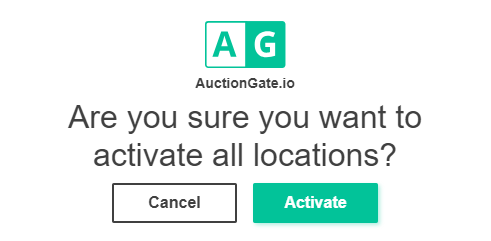 Figure 8 - Confirming/unconfirming activation of all locations
Figure 8 - Confirming/unconfirming activation of all locations
"Destination Ports" tab
When creating a price list, destination ports that are created on the site on the "Settings" page are automatically filled in. To add a new destination ports, click on the "Add" button (Figure 9, Pointer 1). After that the "Destination Ports" window will open, in which fill in the fields (Figure 10):
-
“Destination port name” - enter the name of the port;
-
“Destination country” - Select the country where the port is located from the drop-down list that opens when you click the
 button;
button;
To save the data click on the "Save" button If canceled, click "Close" button. As a result, the created warehouse will be displayed in the table.
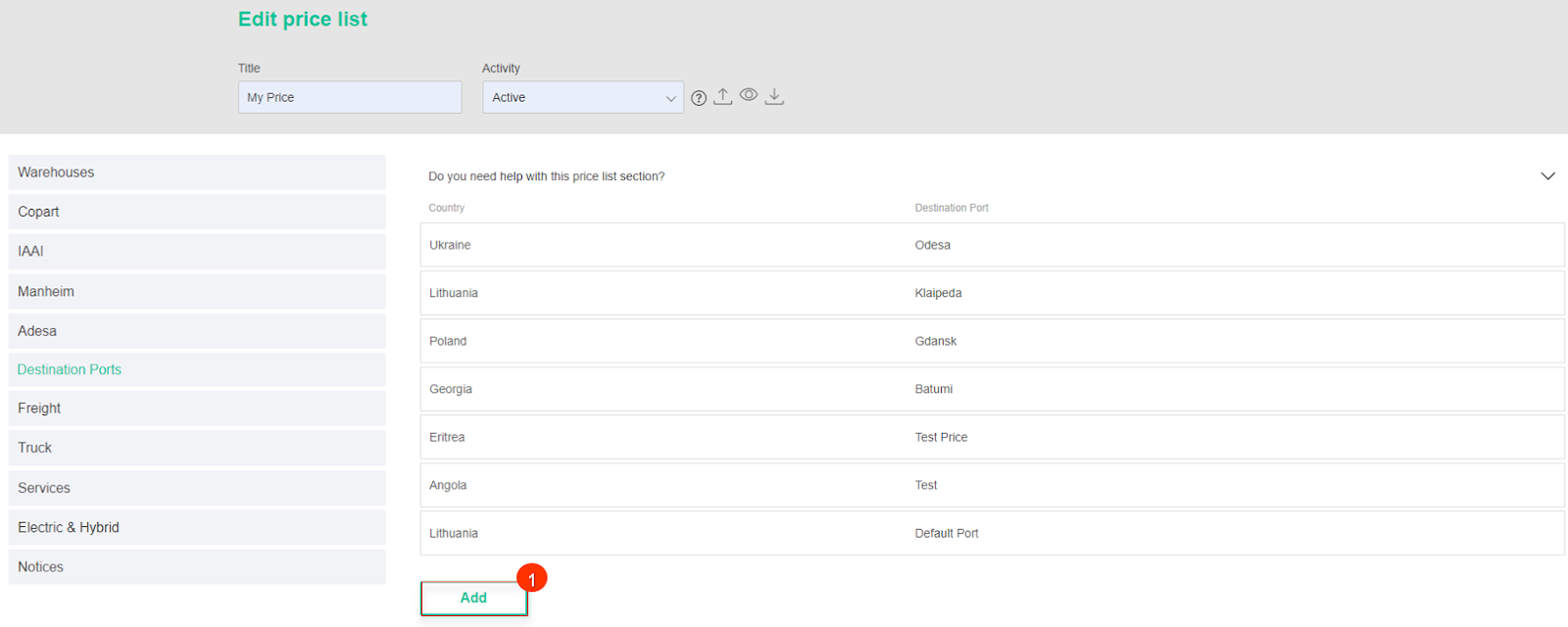 Figure 9 - "Destination Ports" tab
Figure 9 - "Destination Ports" tab
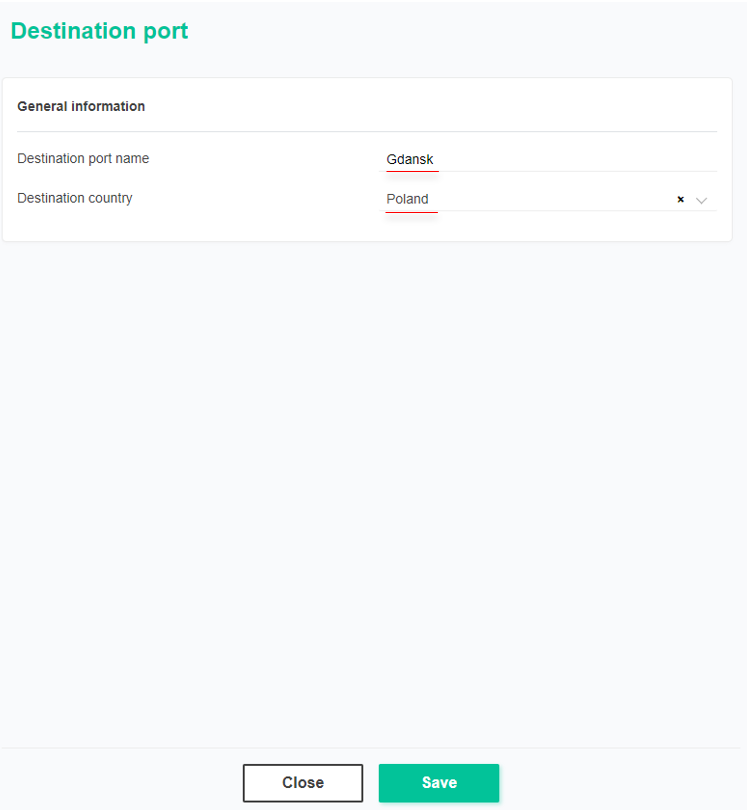 Figure 10 - "Destination country" window
Figure 10 - "Destination country" window
"Freight" tab
To enter the shipping cost to the destination port by sea, click the "Add" button (Figure 11, Pointer 1). This will add a new line (Pointer 2) where you fill in the field:
-
“Warehouse - Loading Pot” - from the drop-down list that opens when you click on the
 button , select the warehouse from which the shipment is to be made;
button , select the warehouse from which the shipment is to be made;
-
“Destination Port” - from the drop-down list that opens when you click on the
 button, select the port to which you want to send;
button, select the port to which you want to send; -
using the keypad or by pressing the
 buttons , enter the cost of sea delivery in the appropriate field by vehicle type (Pointer 3);
buttons , enter the cost of sea delivery in the appropriate field by vehicle type (Pointer 3);
-
"Status" - click the "On" button to activate the freight, in case of cancellation the "Off" button.
To create multiple freights, add the required number of rows and repeat the process of filling in the fields (described above).
If you need to delete a line, click on the "Delete" button (Pointer 4). After that a window will open, in which to confirm the deletion of the location click on the "Delete" button, to cancel the button - "Cancel" (Figure 12).
To activate all freights, click on the "Activate all freights" button (Pointer 5). After that a window will open, where to confirm the activation click on the "Activate" button, to cancel the activation click on the "Cancel" button (Figure 13).
To save the data, click on the "Save" button (Figure 11, Pointer 6).
As a result, the created freight(s) will be displayed on the tab.
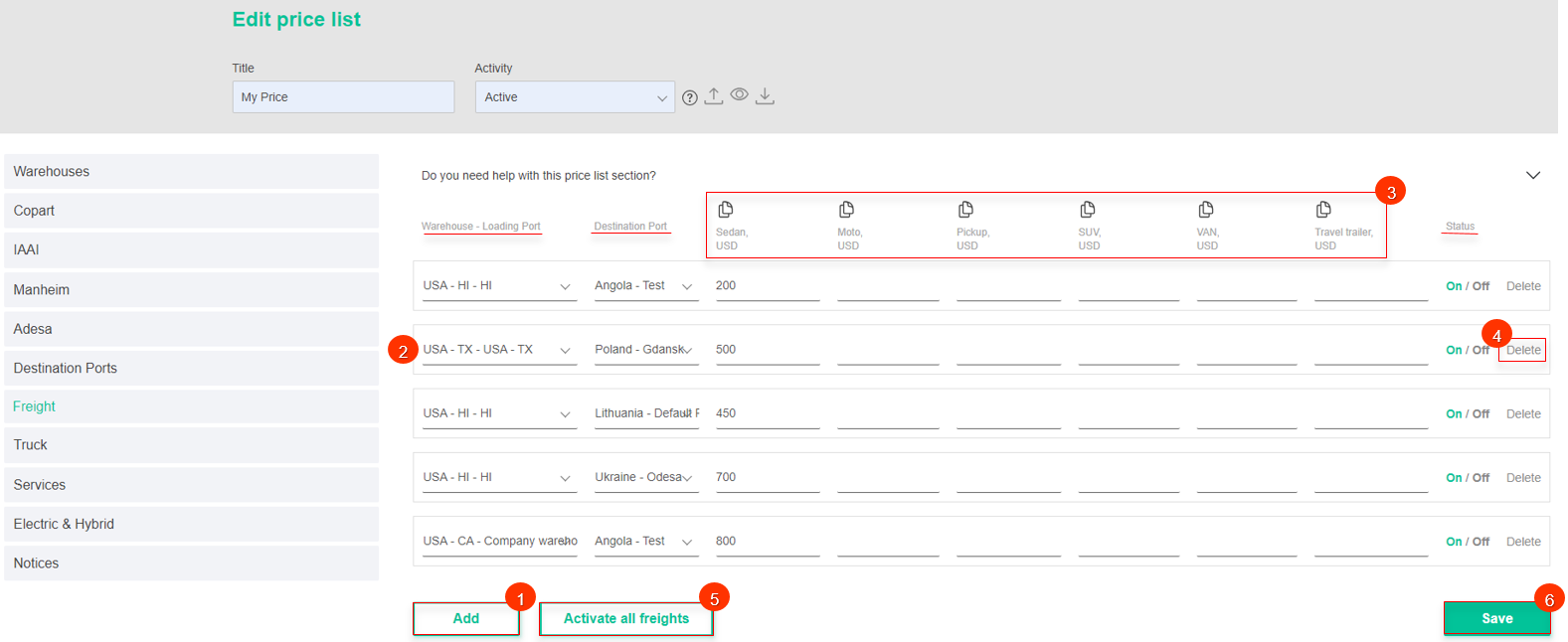 Figure 11 - "Freight" tab
Figure 11 - "Freight" tab
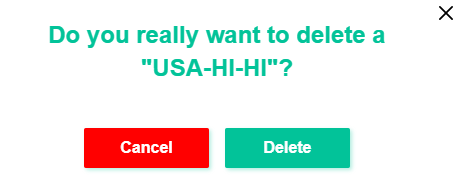 Figure 12 - Confirmation/cancellation of freight deletion
Figure 12 - Confirmation/cancellation of freight deletion
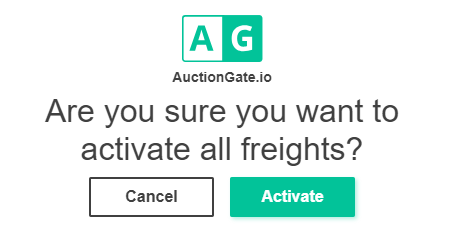
Figure 13 - Confirmation/cancellation of activation of all freights
"Truck" tab
To add a shipping cost to an overland destination, select one of the methods (Figure 14):
-
Click on the "Add" button (Pointer 1). This will add a row (Pointer 2) in which you fill in the fields:
-
"Country From" - from the drop-down list that opens when you click on the
 button , select the country from which you want to send;
button , select the country from which you want to send; -
“Destination Country” - from the drop-down list that opens when you click on the
 button, select the country to which the shipment is to be sent;
button, select the country to which the shipment is to be sent; -
“Destination City” - enter the name of the city to which the shipment is being sent;
-
using keyboard input or by pressing the
 buttons, enter the overland delivery cost in the appropriate field by vehicle type (Pointer 4);
buttons, enter the overland delivery cost in the appropriate field by vehicle type (Pointer 4); -
"Status" - press the "On" button to activate the car transporter, in case of cancelation the "Off" button.
-
Click on the "Fill all Ports" button (Pointer 3). As a result, the data in the "Country From" fields will be filled in automatically based on the "Destination Port" fields, which are filled in the "Freight" tab. The number of filled lines on the "Truck" tab will be similar to the number of filled lines on the "Freight" tab.
After that, fill in the rest of the fields similarly to the first step.
If you need to delete a line, click on the "Delete" button (Pointer 5). After that, a window will open, in which to confirm the deletion of the location click on the "Delete" button, to cancel the button - "Cancel" (Figure 15).
To activate all the carriers, click on the "Activate all carriers" button (Pointer 6). After that a window will open, where to confirm the activation click on the "Activate" button, to cancel the activation click on the "Cancel" button (Figure 16).
To save the data, click on the "Save" button (Figure 14, Pointer 7).
As a result, the created truck/cargo carriers will be displayed on the tab.
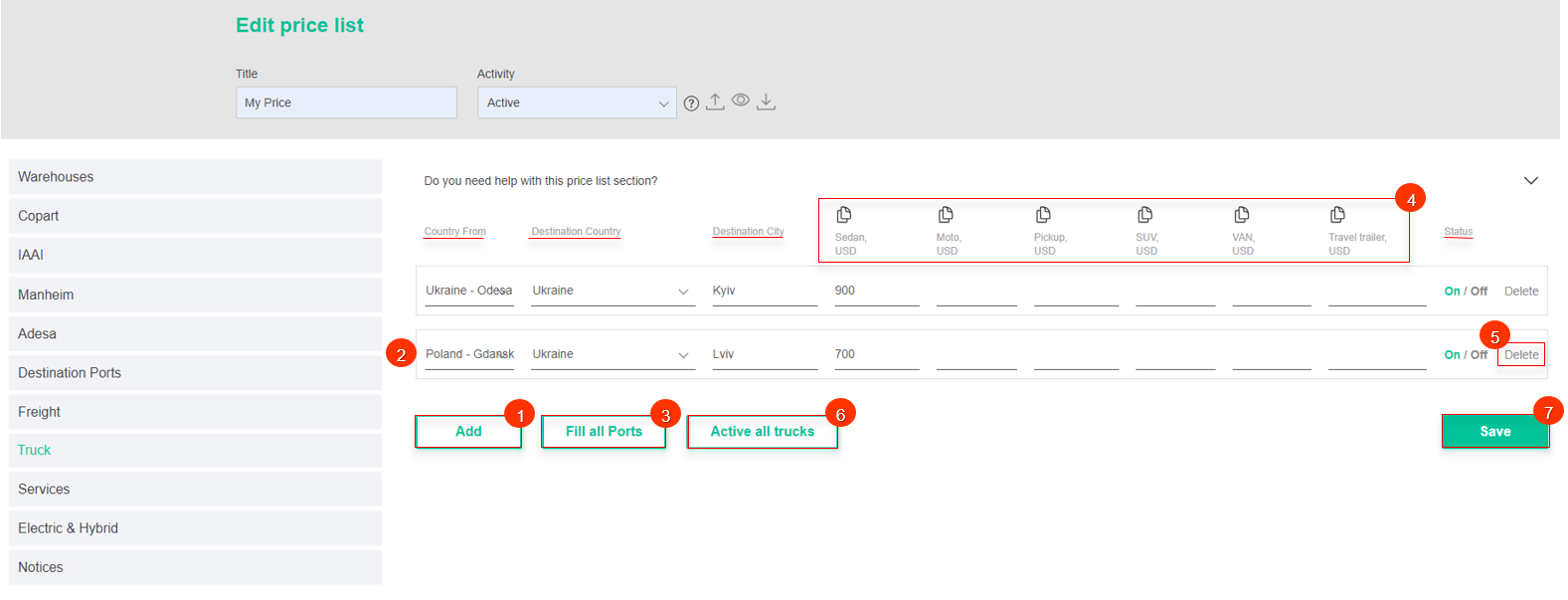 Figure 14 - "Truck" tab
Figure 14 - "Truck" tab
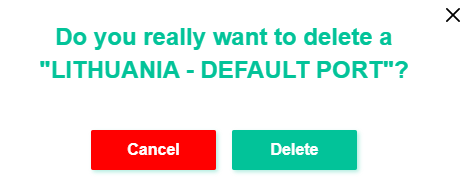
Figure 15 - Confirmation/Cancellation of Truck Deletion
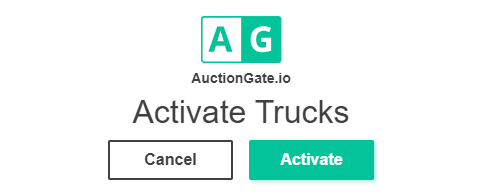
Figure 16 - Confirming/unconfirming activation of all trucks
"Services" tab
To add the cost of additional services that occur during the delivery process, click on the "Add" button (Figure 17, Pointer 1). This will add a line (Pointer 2), in which fill in the field:
-
“Country” - from the drop-down list that opens when you click on the
 button, select the country in which the service will be provided;
button, select the country in which the service will be provided; -
“Service” - enter the name of the service;
-
Using the keypad or by pressing the
 buttons , enter the service price in the appropriate field by vehicle type ( Pointer 3);
buttons , enter the service price in the appropriate field by vehicle type ( Pointer 3); -
"Status" - click on the "On" button to activate the service, in case of cancelation the "Off" button.
To create multiple services, add the required number of rows and repeat the process of filling in the fields (described above).
If it is necessary to delete a line, click on the "Delete" button (Pointer 4). As a result, a window will open, in which to confirm the deletion of the service click on the "Delete" button, to cancel it click on the "Cancel" button (Figure 18).
To activate all services, click on the "Activate all services" button (Pointer 5). After that a window will open, where you can confirm the activation by clicking on the "Activate" button, to cancel the activation click on the "Cancel" button (Figure 19).
To save the data, click on the "Save" button (Figure 17, Pointer 6).
As a result, the created service/s will be displayed on the tab.
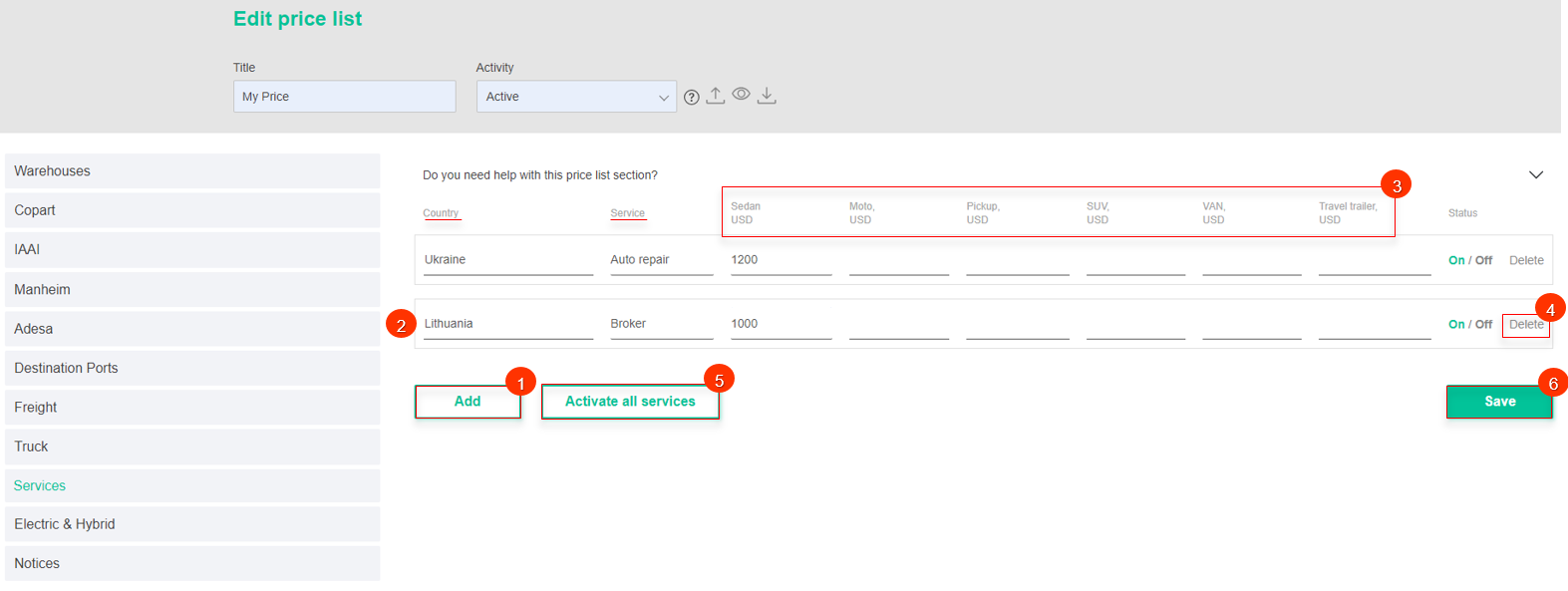 Figure 17 - "Services" tab
Figure 17 - "Services" tab
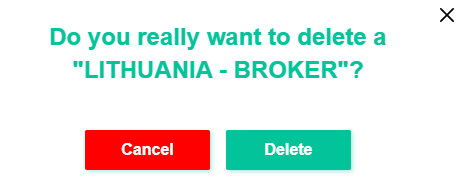
Figure 18 - Confirmation/cancellation of service deletion
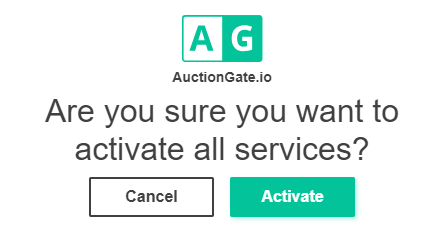 Figure 19 - Confirmation/cancellation of activation of all services
Figure 19 - Confirmation/cancellation of activation of all services
Tab "Electric & Hybrid"
Complete the following fields to add a cost per service for the financial risk services associated with the delivery of electric and hybrid vehicles:
-
"Payment for dangerous cargo" - using keyboard input or by pressing the
 buttons , enter the cost of the service;
buttons , enter the cost of the service; -
"Payment for finance guarantee" - using keyboard input or by pressing the
 buttons , enter the cost of the service;
buttons , enter the cost of the service;
To save the data click on the "Save" button, to cancel the button click on the "Close" button (Figure 20, Pointer 1/Pointer 2).
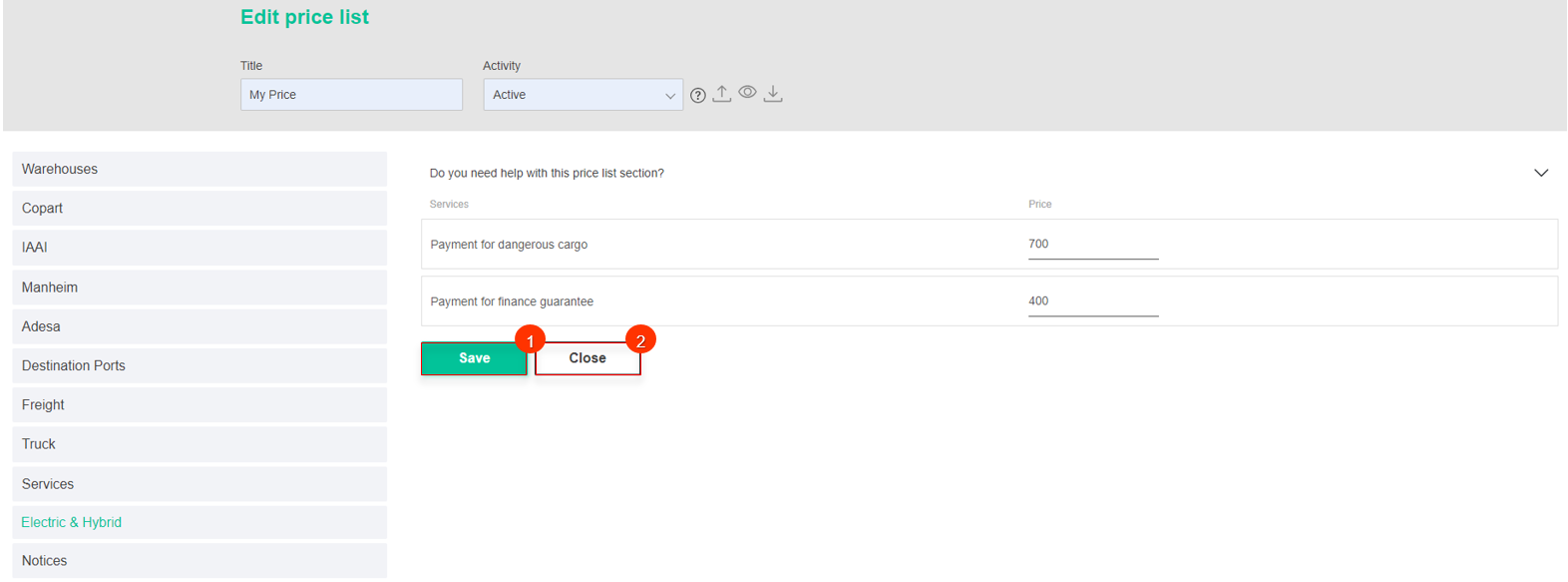 Figure 20 - Electric and Hybrid tab
Figure 20 - Electric and Hybrid tab
"Notices" tab
The tab is designed for message management, here you can add a new notification by entering the appropriate text using the keyboard. This functionality provides a convenient way to update and distribute important messages or notifications in the price list.
Enter the text and click on the "Save" button, to cancel the button - "Close" (Figure 21, Pointer 1/Pointer 2).
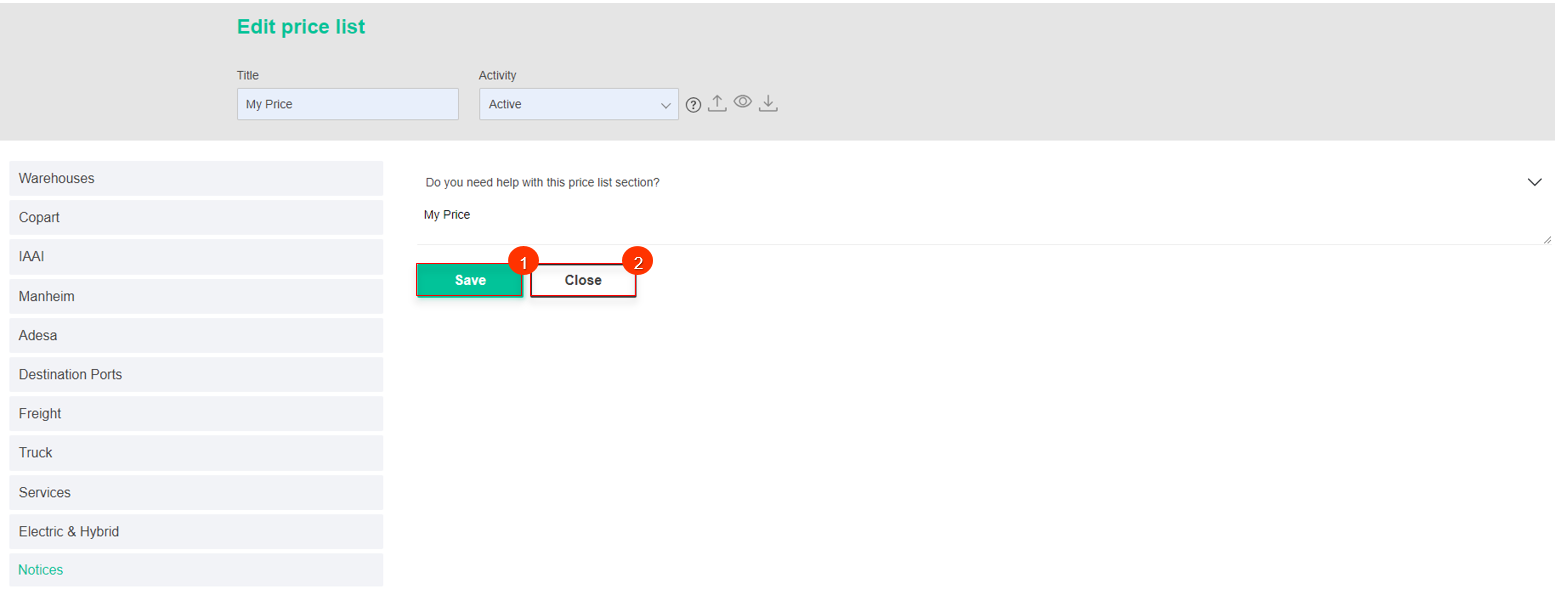 Figure 21 - Notifications tab
Figure 21 - Notifications tab
Once all tabs are filled in, a new price list will be created and displayed in the table (Figure 1, Pointer 9).
Price list editing
In order to make changes to the price list, select the necessary record in the table and click the ![]() button (Figure 1, Pointer 8). This will open the "Edit price list" page (Figure 2), where data changes are made in the same way as when creating a price list (see above).
button (Figure 1, Pointer 8). This will open the "Edit price list" page (Figure 2), where data changes are made in the same way as when creating a price list (see above).
Creating a copy of the price list
In order to create a copy of the price list with the possibility of changing prices, select the necessary record in the table and click the ![]() button, (Figure 1, Pointer 2). This will open the "Price change conditions" window (Figure 22), where you can set the price change conditions in the fields, if necessary:
button, (Figure 1, Pointer 2). This will open the "Price change conditions" window (Figure 22), where you can set the price change conditions in the fields, if necessary:
-
"Min, USD" - using keyboard input or by pressing the
 button , enter the minimum value by which the cost will be increased;
button , enter the minimum value by which the cost will be increased; -
"% increase" - using keyboard input or by pressing the
 buttons , enter the total percentage of increase by which the price will be increased;
buttons , enter the total percentage of increase by which the price will be increased; -
"Max, USD" - using keyboard input or by pressing the
 buttons , enter the maximum value by which the value will be increased.
buttons , enter the maximum value by which the value will be increased.
After that click on the "Save" button, to cancel click on the "Cancel" button. As a result of these actions a copy of the price list will be created, with changed prices according to the specified data in the fields.
Note: if you need to create a copy of the price list, without changing the price, click on the "Save" button, skipping the step of filling in the fields.
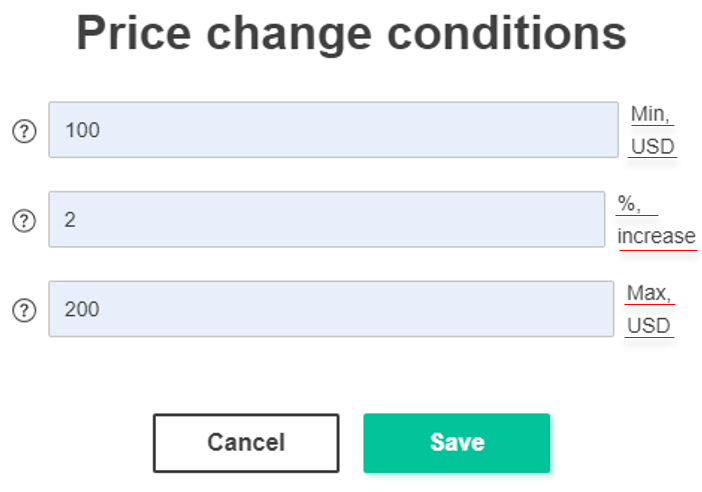 Figure 22 - Create price list copy window
Figure 22 - Create price list copy window
PDF price list creation
In order to create a PDF format for the price list, select the necessary entry in the table and click on the ![]() button (Figure 1, Pointer 3). As a result of the performed actions PDF will be created, as evidenced by the information in the opened window, in which the following actions are available (Figure 23). When you click on the button:
button (Figure 1, Pointer 3). As a result of the performed actions PDF will be created, as evidenced by the information in the opened window, in which the following actions are available (Figure 23). When you click on the button:
-
"Open PDF" - the price list will be opened in a new browser tab;
-
"Download PDF" - the price list will be downloaded to the user's PC.
To close the window, click on the "Close" button.
 Figure 23 - Notification about PDF price list creation
Figure 23 - Notification about PDF price list creation
Exporting a price list
To export the price list, click the ![]() button (Figure 1, Pointer 4), which will open the "Export" window, which consists of two tabular blocks "Current export" and "Completed export". To export a file, select the desired file format and click the "Start" button (Figure 24, Pointer 1/Pointer 2). When the export is complete, the file will be available under "Completed export". Then, click on the "Download" button (Pointer 3), select a location to save the file and click "Save".
button (Figure 1, Pointer 4), which will open the "Export" window, which consists of two tabular blocks "Current export" and "Completed export". To export a file, select the desired file format and click the "Start" button (Figure 24, Pointer 1/Pointer 2). When the export is complete, the file will be available under "Completed export". Then, click on the "Download" button (Pointer 3), select a location to save the file and click "Save".
If you cancel the price list export, click on the "Cancel" button (Pointer 4). As a result of this action, the file will be deleted from the "Current export" table. To close the window, click the "Close" button.
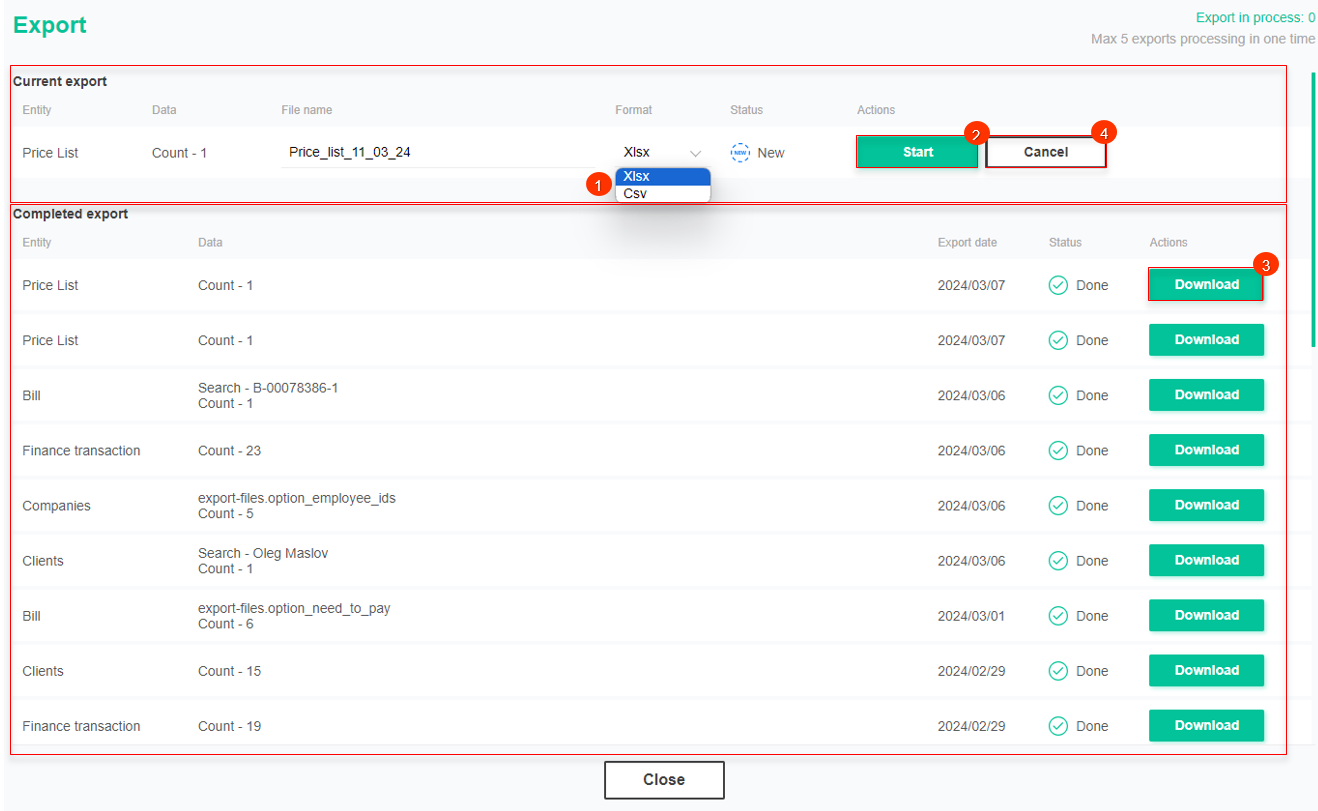 Figure 24- "Export" window
Figure 24- "Export" window
To view the export history of transactions, click the ![]() button (Figure 1, Pointer 5). This action will open the Export window, which is identical to the window used to perform price list export.
button (Figure 1, Pointer 5). This action will open the Export window, which is identical to the window used to perform price list export.
Price list import
To import the price list, click the ![]() button (Figure 1, Pointer 6), which will open the "Import" window, which consists of three blocks "Download template", "Import" and "Import history".
button (Figure 1, Pointer 6), which will open the "Import" window, which consists of three blocks "Download template", "Import" and "Import history".
When you click on the "Download Master price list" button (Figure 25, Pointer 1), a window will appear where you can select a location to save the file and then click "Save". This file is a master price list that includes all existing auction locations, as well as prices for shipping lots from the auction locations to the port of origin. This price list can be edited at your discretion for further importing.
To import a file, click on the ![]() button located in the Import block (Figure 25, Pointer 2). Select the file on your computer or device that you want to import and then click on the "Start import" button.
button located in the Import block (Figure 25, Pointer 2). Select the file on your computer or device that you want to import and then click on the "Start import" button.
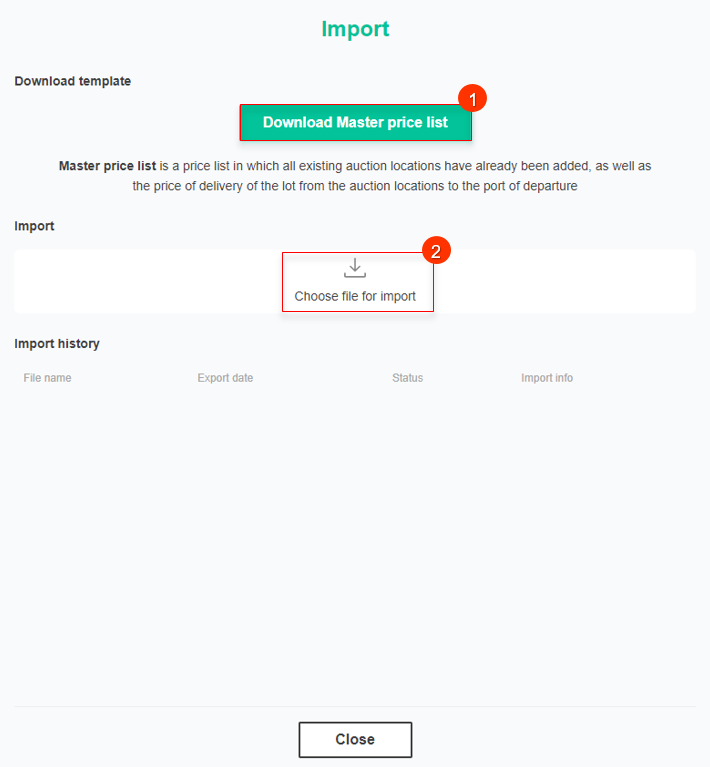 Figure 25- Import window
Figure 25- Import window
Once the import process is complete, the Import history section will provide detailed information on the current status of the import run:
-
Successful import - the corresponding record with information about time and status "Done" will appear;
-
Partly imported - problems occurred during the import process, a record with time and status "Partly imported" will be displayed in the history. In the import information the error log will be displayed for further correction.
Note: If a file format or structure mismatch is detected during the import process, the import operation will not complete and a window will appear indicating the reason for the failure. This may include information about column mismatches, incorrect data format, or other errors that prevent the system from successfully processing the file.
Price list deletion
To delete a price list, select the necessary entry in the table and click on the ![]() button (Figure 1, Pointer 7). After that a window will open, in which to confirm the deletion click on the "Yes" button, to cancel the button - "No" (Figure 26). As a result, the record will be absent in the table.
button (Figure 1, Pointer 7). After that a window will open, in which to confirm the deletion click on the "Yes" button, to cancel the button - "No" (Figure 26). As a result, the record will be absent in the table.
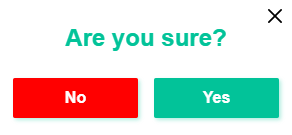 Figure 26 - Confirmation/Cancellation of Price List Deletion
Figure 26 - Confirmation/Cancellation of Price List Deletion



